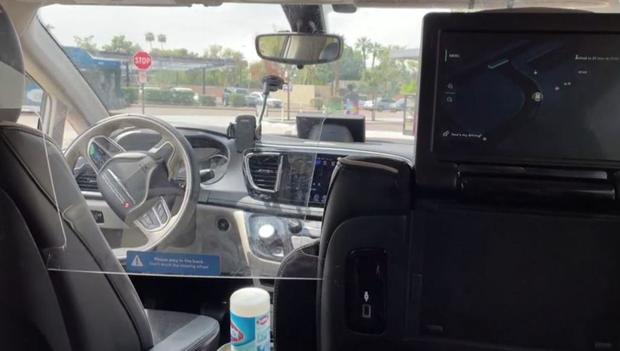Beijing — So-called robo-taxis are everywhere China. Baidu, a technology giant best known for its search engine and sometimes called the Google of China, has self-driving taxi service. It's one of the companies we're testing.

Baidu is currently testing self-driving taxis in 10 cities across the country and will deploy fully self-driving vehicles We just got approved the big cities of Wuhan and Chongqing.
In the capital city of Beijing, where the company is headquartered, the law requires a human to sit in the front passenger seat.
There are sensors, radars and cameras all over the car, and the computer is completely responsible for navigation. With advances in technology, the latest model costs just about $37,000, about half the cost of the previous generation. Price cuts are paving the way for mass production.
The Baidu service itself offers an experience similar to rideshare apps like Uber. After downloading the app on your smartphone and identifying your current location and destination, your car will be displayed. The difference at this stage is that Baidu customers have to choose from a list of existing stops, rather than picking a specific place they want to go. It's like a bus stop.
CBS News tested Baidu's service in Beijing and followed the same route in a traditional chauffeured taxi for comparison.
Baidu's journey itself was smooth, but a bit slower than the old-fashioned way.
Rear-seat screens visually show how the robotaxi's software scans and surveys the vehicle's surroundings, looking for other cars, people, bicycles, and other obstacles. will be
Other customers expressed generally positive opinions about the service to CBS News, saying it was convenient and easy to use, but found it necessary to add available "stops" to their routes. No one expressed any safety concerns.
Baidu claims it has already completed one million rides since rolling out the service five years ago, with plans to expand to dozens more Chinese cities by 2030.
A report on robo-taxis in general by the Boston Consulting Group states that our society will benefit from robo-taxis services. At least the vehicles themselves will reduce congestion, make cities more livable, and run on electricity rather than fossil fuels, which will reduce urban areas.Air pollution.
Self-driving taxis will not be lone robots on China's roads. Just like in the US, food delivery services are already testing small self-driving cars in China, which could soon deliver everything from coffee to pizza.
- Electric Vehicles
- China
- Electric Vehicles
Thank you for visiting CBS NEWS.
Create a free account or log in to
for more features.


